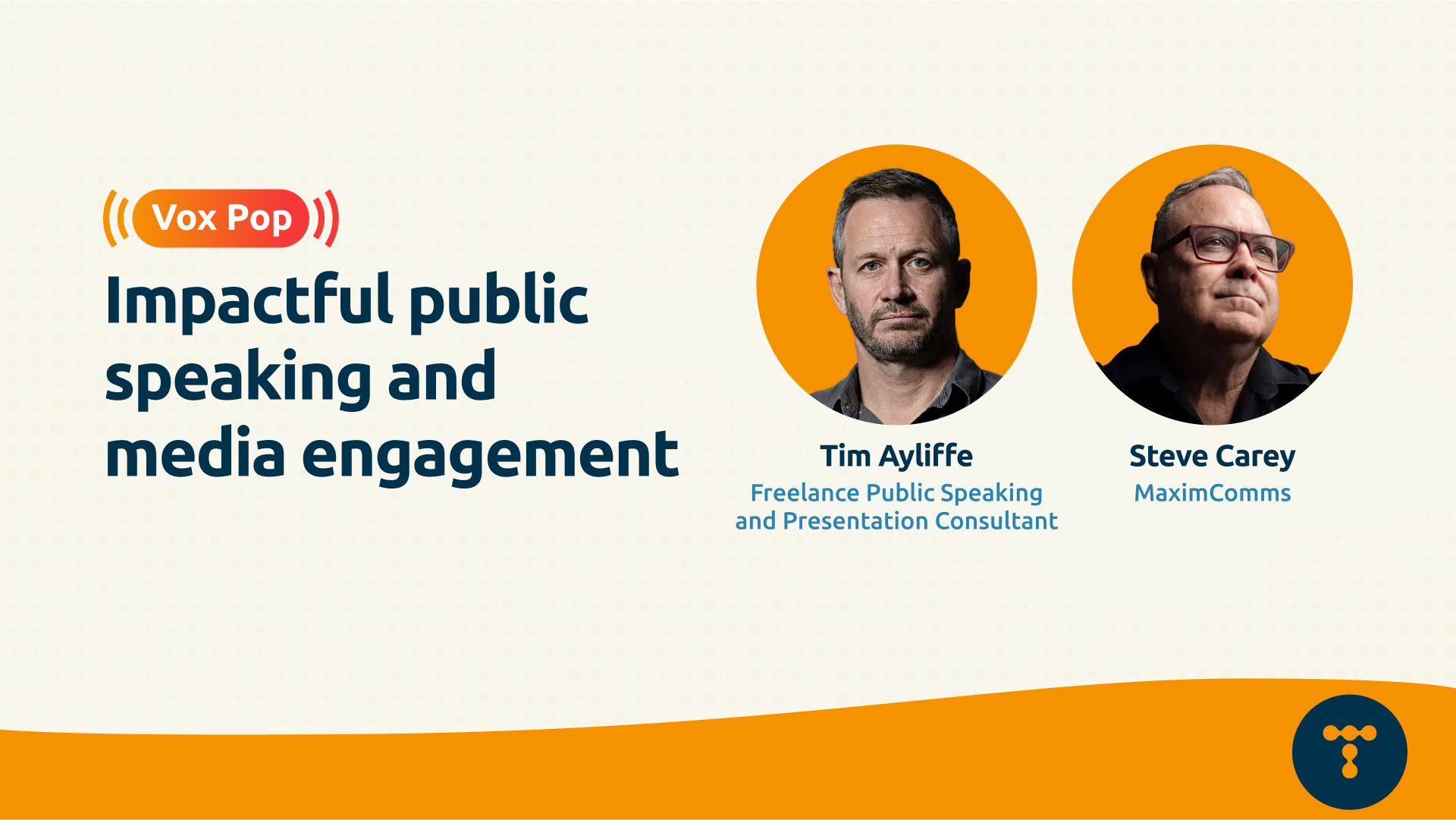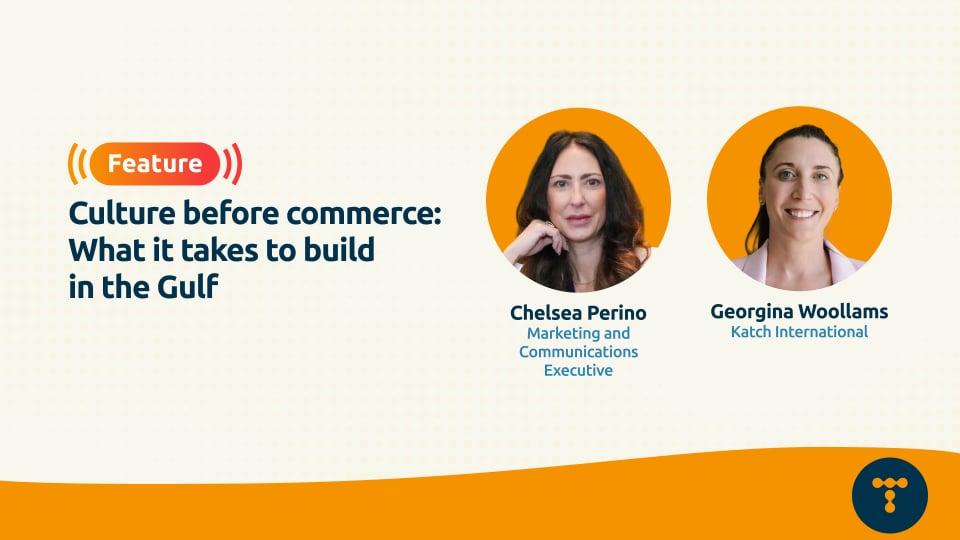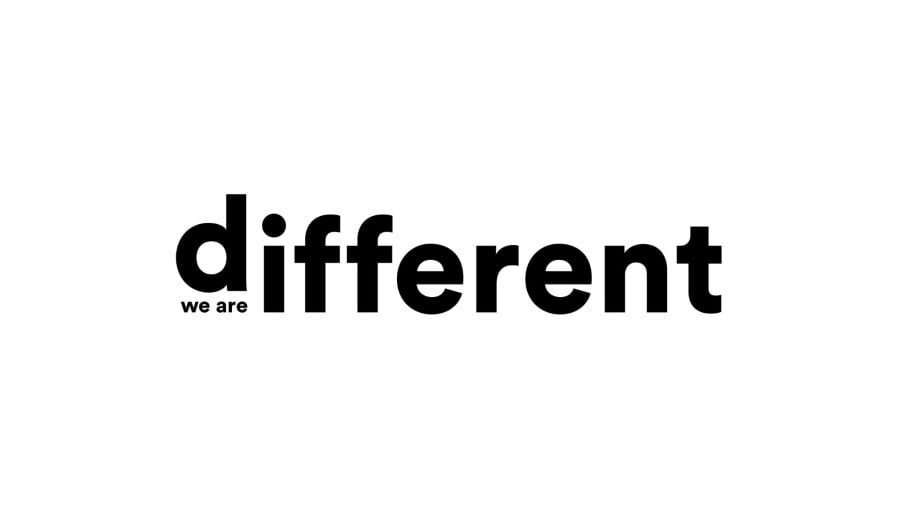The art of public speaking and media engagement goes beyond polished and prepared talking points and facts - they are built on authenticity, empathy, and the ability to connect through storytelling.
Telum Media spoke to Tim Ayliffe and Steve Carey, seasoned TV journalists turned communications professionals, who shared how preparation, emotional intelligence, and purpose can elevate any engagement. Their advice underscores that lasting impact comes from balancing authority with compassion and delivering messages that connect with audiences.
What are the key elements that make media interviews and public speaking engagements impactful?
Steve Carey
The key to impactful speaking lies in connecting with your audience in a way that feels real and memorable. Those who speak with passion, conviction, and a sense of purpose tend to leave a mark.
Strong anecdotes or personal stories help bridge the gap between the speaker and the listener because they are relatable. For example, a victim of crime sharing the raw shock, fear, and long-term impact of their experience, or a champion footballer celebrating a win, showing the elation through voice, movement, and emotion.
Ultimately, it's about having a strong, authentic message that resonates with a wider audience, delivered with honesty and clarity. Those who bring a deadpan or listless energy tend to fail and certainly don’t connect with anyone watching, reading or listening.
Tim Ayliffe
Three things come to mind: authenticity, honesty, and what I like to call "relating the personal".
Whether people agree with you or not, they will always listen when they feel a connection. Sharing something personal or drawn from real life can often achieve that.
Media interviews and public speaking engagements are storytelling opportunities, so it is important to make sure you have a good story to tell.
Throughout your career, you've seen countless examples of people engaging with the media or speaking publicly. What's one common thing they often get wrong without realising?
Tim Ayliffe
People who rely too heavily on talking points lose audiences quickly because they come across as inauthentic and rehearsed. Those who are overwhelmingly negative can also lead to audiences switching off.
Steve Carey
The most common mistake is people not taking a strong position. Sitting on the fence and "waffling" provides journalists and the audience with little value.
To avoid this, always:
• Know what you want to say (top three messages) and rehearse it.
• Pressure-test your arguments with a colleague or trainer before facing the media or audience.
• Bring fresh data or a strong case study to back up your story.
• Avoid jargon or acronyms, as they are barriers to clear communication.
Soft skills like empathy and emotional intelligence are often overlooked in public speaking. How do they influence how a message is received, and how can professionals strengthen these skills?
Steve Carey
Empathy and emotional intelligence shape how your message is received, particularly when delivering tough or sensitive news.
Some key approaches include:
• Consider how the audience will hear and interpret your words - what do they want / need to hear?
• In a crisis, acknowledge those directly affected first because it sets the tone.
• Always ask yourself, "Does this pass the pub test?" If not, think again!
• Rehearse your top three messages with a trusted colleague or professional.
These steps ensure your message balances authority with compassion and respect.
Tim Ayliffe
Real-life examples that support an argument are crucial to a good interview, or speech. Relating a topic to people shows a level of empathy and understanding that is crucial to delivering messages that people will understand and connect with.
When preparing for a media interview or major presentation, what are your top strategies for delivering with impact and managing nerves?
Tim Ayliffe
No matter how experienced you are, you should always have a plan for every public speaking opportunity.
If you are someone who likes to write notes, ensure they're short and in bullet-point form so that you don't get caught out trying to recite a script. But once the interview starts, put your notes away - you won't need them if you have prepared properly.
Also, take a moment for yourself before the interview begins and avoid rushing.
Steve Carey
Preparation and mindset are critical. To deliver with impact, know your topic and craft three clear key messages, rehearse using plain and conversational language, and use a strong anecdote or key data point to set the tone.
For managing nerves, three simple strategies work well. Take several deep breaths before speaking to calm your nerves and steady your voice. Drop your shoulders slightly to reduce tension, which improves overall delivery. Finally, imagine the audience as family friends to shift into a more relaxed storytelling mode.
Many junior professionals hesitate to voice their opinions in meetings or on public platforms. What advice would you give to help them step out of their comfort zone and build confidence in speaking up?
Steve Carey
Confidence grows through preparation and practice.
To step out of your comfort zone, frame your question or comment in terms of its value to the business or audience. Judge the moment and take opportunities when invited. Keep your contributions short, sharp, and to the point. And, accept that the first attempt may not be perfect, but persistence will build confidence.
The more often you contribute, the easier and more natural it becomes.
Tim Ayliffe
People should never be afraid to speak up if they have something important or valuable to add. Pick your moment and keep your cool.

Telum Vox Pop: Impactful Public Speaking and Media Engagement
Telum Media creating connections
Get in touch to learn more
You might also enjoy
When The Executive Centre (TEC) entered Dubai in 2018, flexible workspaces were still relatively niche in the Middle East market. For Chelsea Perino, a Marketing and Communications Executive based in Hong Kong and her team, the challenge was twofold: establishing brand awareness while learning how business is done in the region.
That changed after Covid-19. While many global markets stalled, the region rebounded swiftly. With the rise of hybrid working, the flexible workspace solutions provider fundamentally flipped its business on its head.
The pace of change in the Gulf region is something industry leaders have noticed. Georgina Woollams, Founder and Managing Director of Katch International and whom expanded her agency from London to Dubai more than a decade ago, explained how approaches to brand building and communications have changed over the years as the market transformed:
“The UAE is probably one of the fastest-evolving countries in the world, so we have to adapt to stay on pace continually. With the growth of the country and a recent influx of people from across the globe, we are always finding ways to reintroduce clients to a new audience while simultaneously storytelling to those in the UAE who already know the brand.”
Relationship building in the Middle East and pitfalls to avoid
Chelsea quickly observed that business culture in the Middle East is highly relationship-driven.
Unlike in many Western markets, meetings often begin with personal conversations about family, daily life, or current events before shifting to commercial discussions.
“Making small talk before discussing business details shows that you care about the bigger story behind an initiative. Not doing so can come across as pushy or insincere,” she notes.
Going hand in hand with relationship building is the grasp of cultural nuances and the exhibition of cultural sensitivity. Yet, an often-overlooked aspect for foreign communicators is the sheer diversity of the region, both in terms of language and personas.
Chelsea highlighted the common misconception of treating the Middle East as a homogeneous market. Each territory has its distinct characteristics and media landscape. Dubai and Abu Dhabi, despite being part of the same country, maintain different business personalities. Saudi Arabia, Qatar, Azerbaijan, and Oman each possess unique cultural, economic, and media environments, with varying dialects of Arabic. She added that success in regional communications requires understanding of both English and Arabic media ecosystems.
Georgina pointed out that a 'pay to play' dynamic is prevalent in certain territories, which might be hard to get around, especially if you are in the real estate or trade industries.
“A lot of international people forget that the majority of the wealth in that region is sitting within the Arabic family holding - it would be naive not to take that side of the demographics seriously,” Chelsea observed.
Tailoring communication to different demographics
Beyond building relationships in person, understanding audiences’ preferred communication platforms across Middle Eastern countries is crucial for successful engagement. Each market has distinct preferences shaping both B2B and B2C communications that brands must adapt to.
While longer-form storytelling and business outlooks would be interesting to audiences of traditional media, social media communication in the region is undeniably on the rise. “X (formerly Twitter) usage in the region is high - it’s actually one of the preferred communications platforms - which is why it is important to consider opening branded channels to drive more tailored engagement when an organisation is expanding into the region,” Chelsea exemplifies.
Georgina echoes Chelsea’s sentiment on the importance of localising communication channels and their content to different audiences. On numerous occasions, she has seen international brands enter the market and think one rule fits all, but that is simply not the case. “For our clients, this is a journey of education, understanding what competitors are doing and how they are doing it right. We then adapt one of their campaigns culturally to show them the great results we can achieve, so they let us continue with this strategy.”
On the other hand, young people aged under 30 constitute more than half of the population across the Middle East and North Africa region, with recent estimates from the OECD placing this figure at around 55%. In this context, Georgina also advises PRs to “be ready to adapt; Generation Alpha are tech-led, so find ways to communicate with them in a manner they will respond to. Generation Z want to know you care, so you need to speak with authenticity.”
Advice for first-timers
When asked what guidance she would offer to international communicators entering this market for the first time, Georgina honed in on localisation and authentic engagement.
“It is essential to localise the content, build genuine relationships with specific communities, not just by sponsoring something, but by truly finding a way to engage with the audience you are targeting.”
Chelsea encourages brands to inform their marketing and communications campaigns through a competitive audit. A test-and-learn approach is also highly beneficial, she has found. Rather than crafting an extensive year-long strategy immediately, she recommends focusing on shorter cycles:
“For Q1, focus on specific initiatives and channels, assess what works, and use those insights to inform your strategy for Q2. If you find success with certain activities, amplify them; if something doesn’t resonate, pivot and explore new options.”
She also urged brands to think carefully about where they launch within the UAE, rather than defaulting to Dubai.
“Each Emirate has its own identity,” Chelsea explained. “Some are known for luxury and glamour, some for financial strength and investment, and others are emerging as entertainment hubs.
“Don’t automatically assume Dubai is the best starting point for your initiatives just because it’s the most familiar to an international audience.”
Full-service communications agency, iD Collective, has welcomed two new clients - Quadrant and Kathryn Eisman.
Fashion and lifestyle brand, Quadrant, has tapped iD Collective to lead strategic communications and event management for its Melbourne pop-up. The agency will deliver a campaign to drive awareness and buzz, as well as consumer and community engagement. The multifaceted strategy will encompass strategic media relations, activation logistics and a VIP event, guestlist management, and storytelling.
"We're thrilled to be supporting Quadrant's full-throttle arrival into Melbourne and having the opportunity to activate in line with the Australian Grand Prix - such an epic sporting and cultural moment," said Amanda Booth, Executive Director of iD Collective.
"As experts in the fashion, sport, and the lifestyle space, we are uniquely positioned to bring this global brand to life for a local audience. Our depth of experience enables us to craft creative communications strategies that cut through the noise, drive impact, and build lasting brand equity."
The agency has also announced that it has been appointed as Australian communications partner for journalist, author, and Founder & Creative Director of High Heel Jungle, Kathryn Eisman. The partnership will see iD Collective lead strategic communications in Australia for Kathryn and High Heel Jungle, amplifying her profile across fashion, lifestyle, business and culture, while supporting continued brand growth, media visibility and creative collaborations.
Independent earned-first creative agency, We Are Different, has announced new senior appointments, promotions, and expanded training initiatives.
The agency said the decision comes amid growing market volatility, as it invests in creative leadership, talent, and culture to drive sustainable growth and long-term client value across its PR, social, and influencer divisions.
Jenna Orme has joined the senior leadership team as Head of Difference. Formerly Managing Director at TBWA's FleishmanHillard, she brings more than 18 years of global agency experience across business leadership, integrated comms, and crisis management. In the new role, Jenna will be in charge of strengthening the agency's people-first approach, focusing on team growth and creative excellence.
Siobhan Veddovi-McCaughan has been promoted to Group Performance Director, stepping into the senior leadership team after joining the agency in January 2024. She has delivered work across consumer tech, travel, and food and beverage verticals, and will now oversee earned-first creative work, client partner performance, and team development.
The agency has also welcomed Helaina Young as Performance Executive within its earned division, joining from alt/shift/ in a newly created role.
Alongside new hires and promotions, Different has announced investment in staff development initiatives:
Coaching Culture
Led by industry veteran and former One Green Bean CEO, Claire Salvetti, this initiative gives Different's team members access to an executive coach for one-on-one and group sessions. The program aims to unlock leadership capability at every level by building confidence, sharpening judgement, and affirming the power of doing things differently.
Culture Club
The program draws inspiration from counter-culture movements - from art to astrology, and activism to the creator economy - to provoke different thinking and sharpen cultural instinct. The result is fresher thinking, stronger collaboration, and more culturally resonant work for clients.
Different Academy
The program blends hands-on learning, live client briefs, and applied AI capability to upskill the next generation of earned-first leaders. It embeds learning into the agency's day-to-day operations, improving strategy, creative, client outcomes.
"When teams are supported, challenged and trusted, it shows up in the work," said We Are Different Founder and Director, Stuart Terry.
"We're offering clients an agency culture where ambitious people at all levels are empowered to do the best work of their careers. Partners feel that in the passion of the team, the quality of the thinking and the great results we achieve together."
He added that investing in people remains the agency's competitive edge.
"It's fundamental to do work that earns attention, builds trust, and delivers real commercial impact. Our clients benefit from teams that combine craft excellence with a genuine desire to do things differently."


